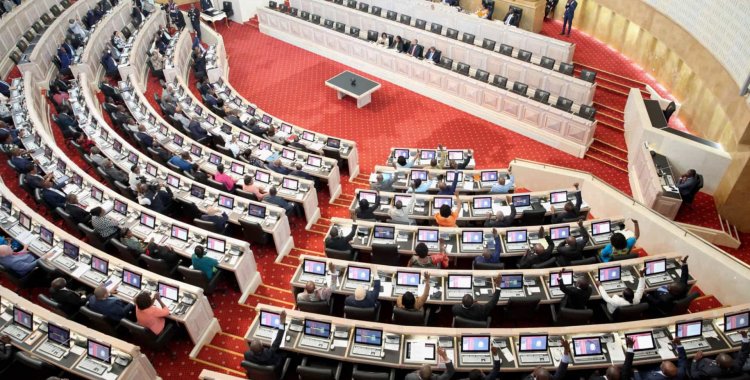The request was presented this Thursday, in a joint statement by the political parties with a parliamentary seat in the opposition, during a press conference in Luanda.
For the opposition, the approved law "does not guarantee fairness, transparency and electoral truth". "We appeal to the President of the Republic not to enact this law, as it stands, because it does not incorporate the guarantees of transparency, fairness and electoral truth that the President requested, on behalf of the people", said Mihaela Webba, deputy of the National Union for the Total Independence of Angola (UNITA), when presenting the declaration.
According to the opposition, the law, approved in a second deliberation, "does not guarantee a peaceful and democratic transition of political power between competitors, it fosters distrust and threatens political stability."
The parliamentary groups of UNITA, the biggest opposition party, of the Broad Convergence for the Salvation of Angola – Electoral Coalition (CASA-CE), deputies from the Social Renewal Party (PRS), the National Front for the Liberation of Angola (FNLA) and not members of a parliamentary group subscribe to the joint declaration.
For the opposition, the law, approved as a whole on Wednesday with 127 votes in favour, by the Popular Movement for the Liberation of Angola (MPLA), 47 against and no abstentions, "puts into question the respect for the sovereignty of the people".
UNITA, CASA-CE, PRS, FNLA and independent deputies also consider that the law in question "is not safe", classifying its position as "a patriotic appeal" to the Angolan President, João Lourenço, so that the diploma is not enacted.
Angola, in 46 years of independence, "has still not changed the party that governs, not by its own will, but by manipulating that will at the polls, computers and the National Electoral Commission" (CNE).
"In practice, it is the House of Security of the President of the Republic that controls the election, because it controls the CNE. And this happens, as we all know, because loopholes in the law are taken advantage of", they refer.
Today, according to the opposition, "all indicators reveal that the people want to use their vote to put the Government party to rest. The same party that usually orders the CNE to announce and publish false results, which it did not compute."
In the second deliberation, the parliament approved the bill that amends the Organic Law on General Elections during the first ordinary plenary meeting of the fifth legislative session of the fourth legislature of the National Assembly, held this Wednesday.
After voting in favor of the diploma, MPLA deputy António Paulo presented his party's declaration of vote stating that the law "shows that the political class is committed" to deepening the democratic and rule of law, stating, however, that the path to go through "it's still long".
This bill returned to parliament, after João Lourenço asked for the reconsideration of some of its norms, namely those relating to electoral corruption and the prohibition of inaugurations of undertakings or public works during the electoral campaign.
The opposition also considered that instead of guaranteeing control of electoral truth, as stated by João Lourenço in a letter addressed to parliament, the National Assembly "is facilitating the diversion of the ballot papers".
"Instead of guaranteeing the equality of competitors, the law now approved treats a party in a privileged way, as if it were the state. This party-state has just gone against the will expressed by the President of the Republic," says the opposition.
"The emphasis that the President of the Republic makes on electoral corruption and its impact on the moralization of society does not mean, nor can it mean, that our sovereign body should limit the review of the law to the content of this article", they also observe.
The general elections in Angola are scheduled for 2022 and at the moment the process of unofficial voter registration of senior citizens is taking place.
Opposition asks João Lourenço not to enact electoral law
Opposition parties asked the President not to promulgate the law that amends the Organic Law on General Elections, approved in a second deliberation with only favorable votes from the MPLA, as they consider it "does not guarantee electoral truth".







